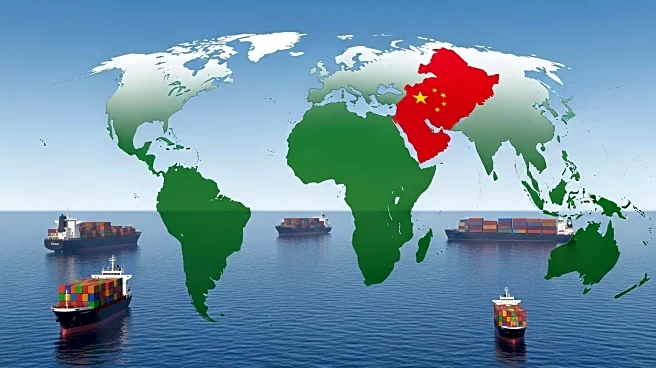What's Happening?
China has achieved a $60 billion trade surplus with Africa in 2025, nearly surpassing the previous year's total. This shift is attributed to Chinese companies redirecting trade to Africa as President Trump's tariffs impact the flow of goods into the United States. In August, China's exports to the U.S. dropped by 33%, while exports to Africa increased by 26%. The surge in exports to Africa includes Chinese-made batteries, solar panels, electric vehicles, and industrial equipment. This development highlights China's strategic move to find new markets amid ongoing trade tensions with the U.S. and a slowing domestic economy.
Why It's Important?
The redirection of Chinese exports to Africa signifies a significant shift in global trade dynamics, potentially affecting U.S. economic interests. As China strengthens its trade ties with Africa, U.S. businesses may face increased competition in the region. This could lead to a reevaluation of trade strategies by U.S. companies and policymakers. Additionally, the trade imbalance with Africa underscores China's ability to adapt to international trade challenges, potentially influencing global economic policies and alliances. The situation may also impact U.S. foreign policy and economic relations with African nations.
What's Next?
The ongoing trade tensions between China and the U.S. are likely to continue influencing global trade patterns. U.S. policymakers may need to address the impact of tariffs on domestic industries and explore new trade agreements to counterbalance China's growing influence in Africa. Additionally, African countries may benefit from increased Chinese investment and trade, potentially leading to economic growth and development in the region. The situation may prompt further diplomatic negotiations between the U.S. and China to resolve trade disputes and stabilize international trade relations.
Beyond the Headlines
The shift in trade dynamics may have broader implications for global economic governance and geopolitical alliances. As China strengthens its economic ties with Africa, it may gain more influence in international organizations and forums, potentially challenging U.S. leadership in global economic policy. This development could also impact cultural and technological exchanges between China and African nations, fostering deeper bilateral relationships. The long-term effects of this trade shift may reshape global economic power structures and influence future trade agreements.










